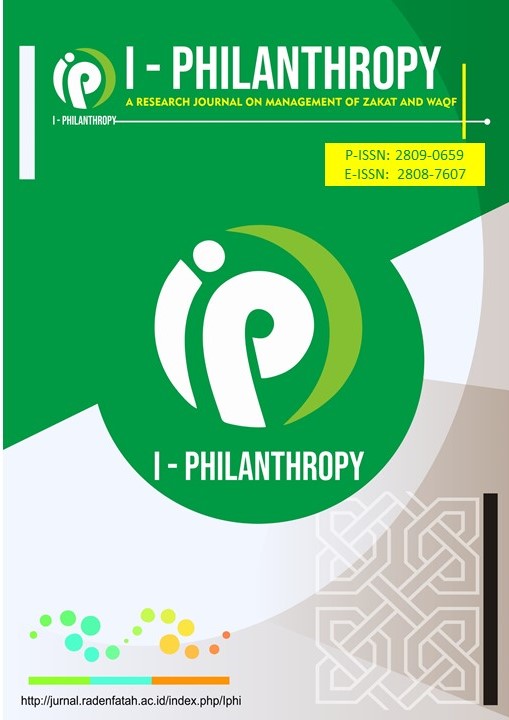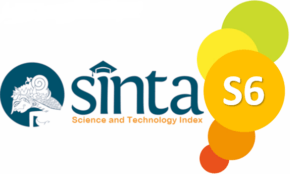Moderation of Altruism on the Influence of Zakat Literacy and Religiosity on Interest in Paying Zakat: A Study on Generation Z in the Society 5.0 Era
DOI:
https://doi.org/10.19109/iphi.v5i1.28538Keywords:
Altruism; Generation Z; Religiosity; Society 5.0; Zakat LiteracyAbstract
Indonesia is recognized as the most generous country in the world, with a national zakat potential reaching IDR 327 trillion. However, the actual collection remains low, at only about 10–15% of that potential. In the era of Society 5.0, Generation Z emerges as a digital-savvy and pragmatic generation, making decisions based on efficiency and ease. While digital technology has simplified zakat payment processes, zakat literacy among the public particularly Generation Z remains suboptimal. Previous studies have shown inconsistent results regarding the influence of zakat literacy and religiosity on the intention to pay zakat; some demonstrate significant effects, while others report weak or no correlation. In this context, altruism is considered a potential moderating variable that may strengthen the relationship between zakat literacy and religiosity on the intention to pay zakat. This study aims to examine the effect of zakat literacy and religiosity on the intention to pay zakat, with altruism as a moderating variable among Generation Z in the era of Society 5.0. The findings are expected to provide a more comprehensive uderstanding of the factors influencing zakat compliance among youth and to contribute to strategies for increasing zakat collection through approaches based on literacy, religious values, and social empathy.
References
Abdullah, Mazni, en Noor Sharoja Sapiei. “Do religiosity, gender and educational background influence zakat compliance? The case of Malaysia”. International Journal of Social Economics 45, no 8 (06 Augustus 2018): 1250–64. https://doi.org/10.1108/IJSE-03-2017-0091/FULL/XML.
Farouk, Abubakar U., Kamil Md Idris, en Ram Al Jaffri Bin Saad. “Moderating role of religiosity on Zakat compliance behavior in Nigeria”. International Journal of Islamic and Middle Eastern Finance and Management 11, no 3 (09 Augustus 2018): 357–73. https://doi.org/10.1108/IMEFM-05-2017-0122/FULL/XML.
Farikhatusholikhah, en Tanti Novianti. “Implementation of the Zakat Village Index to Support a Zakat Community Development Program in Bedono Village, Demak District”. International Journal of Zakat 3, no 3 (25 November 2018): 25–38. https://doi.org/10.37706/IJAZ.V3I3.93.
Fitri, Lailatul, en Falikhatun Falikhatun. “Religiosity, Literacy, Income and Accessibility to Awareness in Professional Zakah Payment”. International Journal of Zakat 6, no 1 (22 Januarie 2021): 39–48. https://doi.org/10.37706/IJAZ.V6I1.268.
Glock, Charles Y. Patterns of religious commitment . University of California Press. Berkeley: University of California Press, 1968. https://archive.org/details/patternsofreligi0000star?utm_source=chatgpt.com.
Hamdani, Lukman, Sunarsih Sunarsih, Rizaldi Yusfiarto, Achmad Rizal, en Annes Nisrina Khoirunnisa. “Social media, trust and intention to pay zakat through institution: lessons from Indonesian experience”. Journal of Islamic Marketing 15, no 9 (06 Augustus 2024): 2399–2418. https://doi.org/10.1108/JIMA-01-2023-0016/FULL/XML.
Hussain, Zahid, Raja Sultan, Asadullah Asadullah, Muhammad Arif, en Aftab Ali. “The Impact of Zakat Literacy, Trust, and the Accessibility of Digital Payments on Generation Z and Y’s Intention to Pay Zakat to Central Zakat Fund, the State Bank of Pakistan”. International Journal of Zakat 7, no 2 (30 Desember 2022): 105–14. https://doi.org/10.37706/IJAZ.V7I2.434.
Hutasoit, Stephanie June, Sulis Mariyanti, Fakultas Safitri, Universitas Psikologi, Unggul Esa, Arjuna Jalan, No Utara, Tol Tomang, en Kebun Jeruk. “ANALISIS HUBUNGAN ATRIBUSI SOSIAL DAN PERILAKU ALTRUISME PADA GENERASI Z DI DKI JAKARTA”. Psychommunity Seminar Nasional Psikologi Esa Unggul 0, no 0 (2023). https://prosiding.esaunggul.ac.id/index.php/SEMNASPSIKOLOGI/article/view/302.
“Indeks Literasi Zakat Nasional 2024”. Pusat Kajian Strategis BAZNAS, 2025. https://puskasbaznas.com/publications/books/2013-indeks-literasi-zakat-nasional-2024-milenial-dan-generasi-z.
Jamaludin, Nur, Muizzudin Sekolah, en Tinggi Ekonomi. “Literacy, Religiosity and Awareness on Zakat of Millennials”. Indonesian Conference of Zakat - Proceedings, 2021, 345–56. https://doi.org/10.37706/ICONZ.2021.271.
Jogiyanto, en Willy Abdillah. Konsep dan Aplikasi PLS (partial least square) untuk penelitian empiris. 1st ed. Yogyakarta: BPFE, 2019.
Judijanto, Loso, Rais Abdullah, Mas’ut Mas’ut, en Bhaswarendra Guntur Hendratri. “The Effect of Digital Zakat and Zakat Education on Muzakki Compliance in Zakat Payment”. West Science Islamic Studies 3, no 01 (31 Januarie 2025): 61–67. https://doi.org/10.58812/WSISS.V3I01.1618.
Kasri, Rahmatina Awaliah, en Adela Miranti Yuniar. “Determinants of digital zakat payments: lessons from Indonesian experience”. Journal of Islamic Accounting and Business Research 12, no 3 (2021): 362–79. https://doi.org/10.1108/JIABR-08-2020-0258/FULL/XML.
Kurniawan, Indra, en Dzikrulloh Dzikrulloh. “Gen Z Behavioral Intentions to Pay Zakat : The Effect Ease of Digital Payments Zakat Literacy and Religiosity”. JOURNAL OF SHARIA ECONOMICS 5, no 2 (01 Desember 2023): 27–38. https://doi.org/10.35896/JSE.V5I2.592.
“LPZN Akhir Tahun 2024”. Jakarta, 2025. https://drive.google.com/file/d/1aMeDyn7IN8YVDeOugSor59UcGWX6YmLK/view.
Machali, Imam. Metode Penelitian Kuantitatif: Panduan Praktis Merencanakan, Melaksanakan dan Analisis dalam Penelitian Kuantitatif. Onder redaksie van Abdau Qurani Habibi. Yogyakarta: Fakultas Ilmu Tarbiyah dan Keguruan UIN Sunan Kalijaga Yogyakarta, 2021.
Masrini, Najmi Laili, Fahmi Medias, en Zulfikar Bagus Pambuko. “Zakat Literacy Among Indonesian Z Generation: Does Gender Matter?” Ulul Albab: Jurnal Studi dan Penelitian Hukum Islam 6, no 2 (29 Mei 2024): 226–37. https://doi.org/10.30659/JUA.V6I2.37034.
Muflih, Muhammad. “Muzakki’s adoption of mobile service: integrating the roles of technology acceptance model (TAM), perceived trust and religiosity”. Journal of Islamic Accounting and Business Research 14, no 1 (02 Januarie 2023): 21–33. https://doi.org/10.1108/JIABR-09-2021-0273/FULL/XML.
Myers, David G. Exploring social psychology. Food Policy. McGraw-Hill Education, 2012. https://archive.org/details/exploringsocialp0000myer_w9j0.
Oktavendi, Tri Wahyu, en Immanuel Mu’ammal. “Acceptance model for predicting adoption of Zakat, Infaq, and Sodaqoh (ZIS) digital payments in Generation Z”. Journal of Islamic Accounting and Business Research 13, no 4 (06 April 2022): 684–700. https://doi.org/10.1108/JIABR-09-2021-0267/FULL/XML.
Puskas BAZNAS. “Buku Konsep Indeks Literasi Zakat”, 2019, 23. https://drive.google.com/file/d/1kOccUb7l_1-dlDclcDadKzOvhoQR7tyW/view?usp=drive_open&usp=embed_facebook.
Sadallah, Mouad, Hijattulah Abdul-Jabbar, Saeed Awadh Bin-Nashwan, en Saliza Abdul Abdul Aziz. “Alms tax (ZAKAT) compliance intention among entrepreneurs from a social cognitive perspective: the moderating role of knowledge”. Journal of Islamic Accounting and Business Research 14, no 8 (22 November 2023): 1133–51. https://doi.org/10.1108/JIABR-04-2022-0104/FULL/XML.
Sayuti, Khadijah M., en Hanudin Amin. “Islamic mortgage adoption: examining the moderating effects of Islamic altruism”. Journal of Islamic Marketing 13, no 8 (24 Junie 2022): 1728–50. https://doi.org/10.1108/JIMA-11-2018-0219/FULL/XML.
Soemitra, Andri, en Juliana Nasution. “The Influence of Zakat Literacy, Trust, and Ease of Digital Payments on Generation Z and Y Intention in Paying Zakat to Amil Zakat Organizations”. Indonesian Conference of Zakat - Proceedings, 2021, 323–34. https://doi.org/10.37706/ICONZ.2021.266.
Solimun. Multivariate analysis: struktural equation modelling (sem), lisrel, dan amos. Malang: penerbit universitas negeri malang, 2002.
Sugiyono. Metode Penelitian; Kuantitatif, Kualitatif dan R&D. Bandung: Alfa Beta, 2022.
Syaksena, Atiqa, en Marlina Ekawaty. “Effect of zakat (almsgiving) literacy level on muzakki’s decision to pay zakat in registered zakat institutions”. Journal of Islamic Economics Management and Business (JIEMB) 3, no 1 (01 Junie 2021): 15–34. https://doi.org/10.21580/JIEMB.2021.3.1.8841.
“Together, we give more | Charities Aid Foundation”. Toegang verkry 23 Mei 2025. https://www.cafonline.org/.
Ur Rehman, Aziz, Ejaz Aslam, en Anam Iqbal. “Factors influencing the intention to give zakāt on employment income: evidence from the Kingdom of Saudi Arabia”. Islamic Economic Studies 29, no 1 (30 September 2021): 33–49. https://doi.org/10.1108/IES-05-2020-0017.
Yerrou, Hafssa, Amina Achmaoui, en Oumaima Bezoui. “The determinants of institutionalization of Zakāt: the case of Morocco”. Islamic Economic Studies 31, no 1/2 (12 Desember 2023): 22–42. https://doi.org/10.1108/IES-01-2023-0003.
Yusfiarto, Rizaldi, Ananda Setiawan, en Septy Setia Nugraha. “Literacy and Intention to Pay Zakat”. International Journal of Zakat 5, no 1 (14 Julie 2020): 15–27. https://doi.org/10.37706/IJAZ.V5I1.221.
Downloads
Published
Issue
Section
License
Copyright (c) 2025 Laila Ifti Faiyah, Syamsul Hilal

This work is licensed under a Creative Commons Attribution-ShareAlike 4.0 International License.
Copyright Notice here












